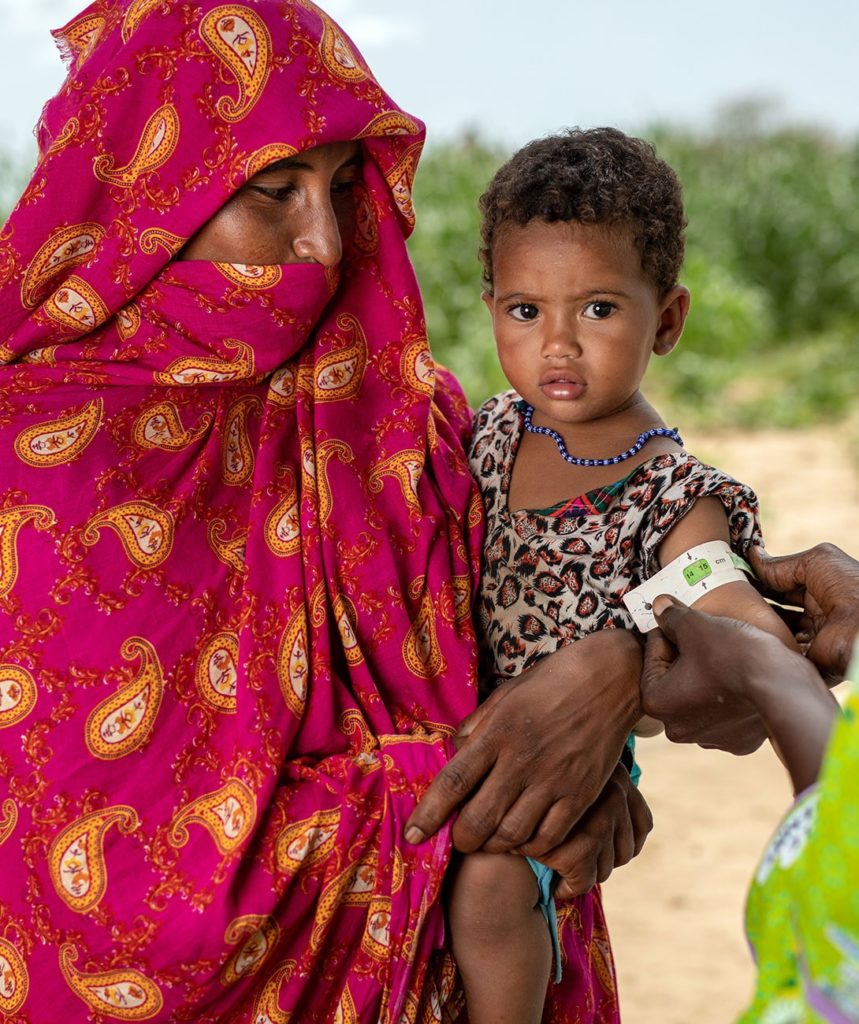Article from our Water, Sanitation and Hygiene Barometer 2021
By Lise Lacan and Julie Mayans, SOLIDARITÉS INTERNATIONAL.
From nutritional deficiencies and the effects of climate change to insufficient access to health care or water, sanitation and hygiene (WASH), a number of factors can lead, directly or indirectly, to malnutrition. This is why, over the past several years, SOLIDARITÉS INTERNATIONAL has developed integrated WASH, Food Security and Nutrition approaches to fight the affliction.
Malnutrition is a major public health problem. In 2019, 1 out of every 3 children under the age of 5—some 200 million children—was either undernourished* or overweight**. Getting adequate nutrition in early childhood is essential to healthy physical and intellectual development. Nutritional deficiencies at this stage of development can, of course, lead to diseases or death, but they can also have long-term effects on social and cognitive abilities, success in school, productivity at work and, by extension, hold back an entire country’s socio-economic development.
The causal link between insufficient access to drinking water and sanitation infrastructures and nutritional deficiencies is well documented***. Inadequate sanitation facilities and open defecation, an ongoing daily reality for 1 billion people, are proven causes of water source contamination, which leads to an increased risk of diarrhoea and associated problems: loss of appetite, dehydration and malabsorption of nutrients. Every year, 2.1 million children die as a direct or indirect consequence of diseases linked to unclean water or inadequate sanitation. The combination of inaccessible sanitation services and poor hygiene thus factors into 88% of deaths from diarrhoeal diseases.
The link between undernutrition and food security is even more indisputable. A number of diet-related factors can come into play, including lack of access to or availability of suitable nourishment and poor food safety practices (food hygiene, conservation, preparation, etc.). Providing support for crop and livestock farming in order to foster food self-sufficiency or raising awareness about good food safety practices are just two examples of food security interventions that can help prevent risks and bring malnourished children back to health.
To fight undernutrition and reach the World Health Organization’s 2025 global targets, we need to adopt a multisectoral approach aimed at improving sanitary conditions and access to adequate nourishment for all.

This is why SOLIDARITÉS INTERNATIONAL has been carrying out integrated WASH, Food Security and Nutrition projects. As part of this effort, our NGO has joined forces with medical stakeholders such as ALIMA, an organization we have been working with since 2018 to fight mortality linked to malnutrition in the Far North region of Cameroon.
Insecurity and massive population movements in the region have plunged countless families into a state of serious vulnerability. SOLIDARITÉS INTERNATIONAL is on the ground there, distributing food vouchers to purchase nutritional products and leading awareness-raising sessions to teach good food safety practices.
To break the vicious cycle of diarrhoea and malnutrition, our teams are distributing hygiene kits to families with malnourished children being treated at health centres. We are also working to improve access to WASH services and infrastructures in health centres and communities, and are building local capacity to ensure their long-term sustainability.
Integrated projects like these yield tangible results, but in order to be effective, they must be carried out over the long term and accompanied by a change in practices at the local government level and among the populations themselves. SOLIDARITÉS INTERNATIONAL aims to systematize this approach and implement it in every one of our countries of intervention afflicted by malnutrition.
*Undernutrition occurs when a person’s diet lacks the nutrients necessary for them to grow and thrive, or when they are unable to fully digest the food they take in as a result of illness.
**“The State of the World’s Children 2019 – Children, Food and Nutrition: Growing Well in a Changing World,” UNICEF, 2019
***“Improving nutrition outcomes with better water, sanitation and hygiene: Practical solutions for policy and programmes,” WHO, UNICEF, USAID, 2015
> READ THE 2021 BAROMETER OF
WATER, SANITATION AND HYGIENE
Photos © Gwenn Dubourthoumieu / SOLIDARITÉS INTERNATIONAL
